HORTNEWS



ture export, closing orchards and hurting the communities that rely on the industry’s prosperity.
KIWIFRUIT GROWERS and orchardists are celebrating a decision by the Environmental Protection Authority (EPA) allowing them to continue using sprays like Hi-Cane which contains hydrogen cyanamide.
Kiwifruit grower’s advocacy group New Zealand Kiwifruit Growers (NZKGI) led the industry to advocate strongly for the retention of Hi-Cane since the EPA’s call for information on the chemical in 2020.
NZKI argued that a ban would have had a massive economic impact on the country’s most valuable horticul-
Hi-Cane, used once per year on kiwifruit orchards, is a critical chemical for the success of the kiwifruit industry. It promotes uniform bud break of flowers, ultimately maximising the production of high-quality kiwifruit. It has allowed our industry to remain competitive and profitable in the markets to which we export.
NZKGI chief executive Colin Bond thanked growers and wider stakeholders who fought for the continued use of Hi-Cane.
“That the EPA’s decision-making committee has decided for the reten-
tion of hydrogen cyanamide speaks for the industry’s collaborative response through many years of hard work. Growers and the communities who rely on our industry’s success will be relieved that the EPA have made the right decision to retain its use.
“Hi-Cane is a vital tool for kiwifruit growers and its retention will help support a booming industry. Despite the decision today, we will continue to protect our workers and environment and we are committed to an ongoing programme of continuous improvement and best practice that focuses on safe spraying practices both from a human and environmental health perspective.
“The industry has adopted a coor-
dinated approach to maintain safe spraying practice over many years mandating low-drift technologies in relation to buffer zones and going above and beyond the required standards. In addition, we have engaged with the communities in which we live and work, including an education programme, so that people who have remaining concerns can get a better understanding of the chemical.”
Bond noted that the announcement of the retention of hydrogen cyanamide comes with some new controls, and they will now analyse the impact of these restrictions and consult with growers.
One of the country’s largest grow-
Jack Frost at his worst recently on the Ohakune property of Steph and Bruce Rollison. This was the scene on one of the four days when the frost hit their Brussels sprout crop but fortunately causing no major damage. More on the frost and challenges of growing vegetables in a cold and changing climate on page 2.



ers, Seeka Limited notes that the benefits from using Hi-Cane are significant.
Seeka chief executive Michael Franks says the EPA decision keeps the existing approvals, adjusts the rules for its use, updates its hazard classifications and removes the suggestion of a 10-year horizon for the use of the product.
Seeka is supportive of the proposed adjustments, which align to Seeka’s current operating procedures as a responsible orchard manager and grower, he says.
“Seeka takes its environmental responsibility very seriously and is confident the decision achieves a good outcome for kiwifruit growers without compromising the environment. We applaud the process and outcome,” says Franks.
The EPA says it’s important New Zealanders have confidence that hazardous substances such as hydrogen cyanamide are safe to use, and the rules for their use are appropriate for the level of risk.
“This decision demonstrates our robust reassessment process operating as it was designed to do, with the aim of achieving the best possible outcomes for people and the environment,” says Dr Chris Hill, EPA general manager hazardous substances and new organisms.
The EPA conducted comprehensive risk assessments, considered new research about potential effects on health and the environment, and weighed the economic benefits of continuing to use this chemical against the potential impacts on people and the environment.
“We also publicly consulted on our proposed changes and held a hearing, which gave individuals and industry a chance to provide valuable information.”

A COLD growing season has thrown something of a spanner in the works for many commercial growers around Ohakune in the Central North Island.
Steph and Bruce Rollison grow parsnips and Brussels sprouts on their property just outside the township and in recent months were hit by four days of severe frosts which has had some impact on their operation.
Bruce says the Brussels sprouts haven’t sized up as much as they normally do despite the fact the crop received the same nutrient management programme they normally apply.
He says frost and the
cold weather put the crops into senescence earlier. Senescence means that while the crops continue to grow, they do so more slowly than normal. This does not affect the quality of the crop, and in fact Bruce and Steph will be harvesting their parsnips up until September.
Bruce says the reason winter crops such as carrots, parsnips, potatoes and Brussels sprouts grow successfully in Ohakune is the cold climate.
He says they expect their yield to be down by at least 15% but adds that the quality of the crop is very high.
“Earlier we saw late blossoms in spring and ground temperatures were cooler, and we have had a higher-than-normal rainfall during the
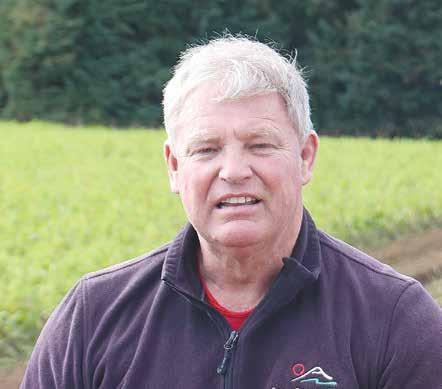
summer. We also haven’t had the heat units and sunshine, which are important because the
greater the UV, the more vibrant the vegetables will be,” he says.
In the last few weeks
somewhat ironically, they do better in a dry year because the Brussels sprout is a big leafy green plant which needs lots of water, but in fact is great at harvesting the dews at night.
Like all growers, the Rollisons are having to deal with the changing climate and, to meet the challenges of this, are investing in new varieties of Brussels sprouts that will perform better.
Steph Rollison says the aim of planting the new varieties is not to extend the harvest season, rather it is to get plants that will perform well to the September end of harvest.
The other challenge for the couple is labour, especially younger staff. Bruce says he and Steph are both in their mid-fifties and so are most of their staff.
THE FIGHT to continue using sprays like Hi-Cane has been costly for kiwifruit growers.
NZ Kiwifruit Growers Inc (NZKGI) chief executive Colin Bond says it cost the small advocacy organisation most of its retained earnings.
“The doubt that has been cast on our industry over the last several years has had serious consequences on the well-being of our growers as well as creating financial uncertainty across the industry.
“Orchard prices have dropped significantly throughout the assessment, which will be partially attributable to the risk felt by investors. The reassessment would have no doubt inhibited growth at a time when export earnings are critical for our national economy.
“An independent economic report commissioned by NZKGI found that if Hi-Cane was in fact banned, it would have a significant impact on New Zealand’s economy, including Māori growers and their whānau and communities.
“These concerns were voiced clearly by growers at the hearing on the reassessment.”
NZKGI claims the initial reason that the EPA wanted a reassessment and proposed a phase out of hydrogen cyanamide was due to human health concerns.
“Based on overseas information, the EPA were concerned that the chemical had carcinogenic properties. However, evidence provided to, and accepted by the EPA, has shown that this is not the case. Despite these
CHANGES TO the hydrogen cyanamide approval by EPA include:
• One application can be made per year with a maximum rate for kiwifruit, and all other crops.
• Spray buffer zones must be created for bystanders, the aquatic environment and non-target plants downwind.
• Application is limited to ground-based methods and nozzles and appropriate mixtures of hydrogen cyanamide, water, and/or adjuvants that will produce a coarse or larger droplet size.
• A maximum wind speed is specified when applying the substance to crops.
• Spraying is restricted to 1 July-10 September.
• More stringent requirements for qualifications are required for professional users.
findings, the EPA continued with its reassessment and proposed a phase out of the chemical, albeit over a

longer period than initially recommended, due to concerns that HiCane is harmful to birds and some
soil organisms.
“We used to be able to bring in 16-year-old kids who wanted to get involved and we kept them for 10 or 12 years, when they decided wanted and to move on and take up another career,” he says.
But alas, they are not getting the young people in, so are looking at options for mechanical harvesting.
Bruce says while this is possible for harvesting parsnips, Brussels sprouts still need to be picked by hand.
“What I do now is to have a crew of two who help me with the parsnips and the rest of the staff just do the sprouts, so overall, that’s a much reduced team,” he says.
“However, expert reports stated that the EPA’s risk assessments relating to birds and soil organisms were overly conservative and this is backed up by grower observations.”
The EPA says Hi-Cane is widely used in the kiwifruit industry to help buds form by simulating the effects of frost. It is also applied to some apple, cherry, apricot, and kiwiberry crops. Products containing hydrogen cyanamide are restricted to commercial use and can only be used by trained professionals who must follow strict rules when spraying.
The rule changes include further restrictions to the way hydrogen cyanamide products are used, how much can be sprayed, and the need for buffer zones when spraying crops.

WITH NORTHLAND’S kumara industry back on track after the devastation of Cyclone Gabrielle, one Kaipara farming couple have a simple message for those who helped: “thank you”.
Like many growers in the region, James and Krista Franklin’s property near Dargaville was hit hard by Gabrielle after the Kaihu River burst its banks in February last year.
“We were warned about a storm coming, but never did we expect the devastation that Cyclone Gabrielle dealt to us,” Krista said.
After a night of very heavy rain, the couple woke to find the field across the road had turned into a lake, and knew they were in trouble. They took their two young girls to James’ parents’ home and after driving his family to safety, James returned to the farm to try to save what he could.
While the couple’s home was fortunately spared due to being built up on piles, hectares of kumara were completely underwater.
In the days that followed, the pair endured a nervous wait. The longer the water sat on their fields, the greater the damage was likely to be.
Some exploratory digs confirmed their worst fears – most of the kumara had started to rot and, in the end, they were

only able to harvest 16% of their total crop.
The most agonising part was that the cyclone hit only a few days before the date they had planned to harvest.
“We had, like many other growers, decided to leave it a couple of weeks to size the crop up,” Krista said.
“Hindsight’s a wonderful thing – it was probably the worst mistake we’ve made in our lives.”
The physical and financial damage was so bad that the couple seriously considered leaving the business.
“But in the end, we decided that we’d kick ourselves if we didn’t try again,” Krista said.
As James and Krista faced the daunting task of cleaning up and starting over, Krista said they realised, more than ever, the importance of mental wellbeing, including taking time to get off the farm to unwind.
“It’s a very lonely place when you’re not sure where to turn,” she said.
“But there were amazing events run by Rural Support Trust Northland, as well as the Northern Wairoa Vegetable Growers Association – they hosted lots of dinners and lunches where we could all get together as growers.”
Rural Support Trust Northland Chair Michelle Ruddell said, in the aftermath of Gabrielle, the trust organised a wide variety of support initiatives to help farmers like James and Krista.
“The initial impact on farmers was incredibly stressful,” Michelle said.
“Kumara growers had lost upward of 70 per cent of their crops, but initially no one knew just what the damage was – people were shell shocked.
“The ongoing rain had a more insidious impact on people. The weather
growers
and Krista Franklin says support from Rural Support Trust made an incredible difference in their recovery from Cyclone Gabrielle.
ground people down.
“Rural Support is here to create opportunities for our farmers and growers to get off-farm, connect
with other farmers and growers, to realise they are not alone.”
Michelle said Rural Support Trust Northland organised 100 events supporting farmers in 2023, with 5500 people attending, and facilitated the clean-up of 135 farms.
The number of oneon-one support clients being helped by the trust increased from 45 before Gabrielle, to 145 afterwards.
Care packages were sent out to 960 farmers, which included $1,000 Countdown vouchers to enable them to hold endof-harvest events with their teams.
RURAL SUPPORT Trust receives funding from a range of sources, including the Ministry for Primary Industries, private donations, and from corporates.
ANZ New Zealand was one such company, donating $100,000 to the trust’s Cyclone Gabrielle relief effort.
Michelle Ruddell says the funding went towards care packages for farmers and training trust staff and agri-sector professionals to better support the community, and recognise signs of distress.
“ANZ’s contribution made a genuine difference for our farmers and growers,” Michelle said. Krista realised the impact Rural Support Trust had at times like these, and soon after Gabrielle hit, she decided to get involved herself.”





JAMIE WELLS, 29, an agronomist at Balle Brothers, is the 2024 Pukekohe Young Grower of the Year.
Held at LaValla Estate in Tuakau, the competition tested the vegetable and fruit-growing knowledge of seven contestants along with the skills needed to be successful growers.
Throughout the day competitors completed modules in marketing, compliance, pest and disease identification, safe tractor driving, finance, soil and fertilisers, irrigation and quality control. At the gala dinner later that evening they each delivered a speech and competed in a panel discussion.
Wells says the shock of the win is now starting to
wear off and says that the Young Grower competition is a great opportunity to challenge your horticultural skills and to meet other young horticulturalists.
“I feel like with horticulture, even if you come from a background without any history of growing, you will be able to get far in it. That’s from a personal experience too — I’ve come from a family with no horticultural history, and then to get this far with perseverance and dedication. If you give it your best shot, you can go far.”
Wells is pleased with his performance at the competition but admits feeling a little out of depth with the tractor driving as he doesn’t

spend much time driving vehicles as part of his horticulture work.
For the marketing
module, Jamie designed a grilled onion charcoal briquette. His theoretical product would use waste
onions and put them through a carbonisation process to have them dehydrated for use in a
Introducing Hort News, a national publication serving the needs of our booming horticulture sector.
Distributed with the leading national farming publication Rural News, Hort News will be delivered to all key horticulture regions nationwide.
It is the complete solution for readers and advertisers, covering every aspect of the wider horticulture industry – news, agribusiness, management, markets, machinery and technology.
• It’s the one-stop way to reach the horticultural sector
• News and information for all types of growers
• 10,000 nationwide distribution
• Sent out with the trusted and established publication Rural News
barbecue grill.
“That was my concept: a new way to use waste that wasn’t going to be used for anything else, perhaps maybe stock feed.”
Runner-up was 21-year-old Jack Haddon, an operator and chemical applicator at Balle Brothers.
Wells says Haddon is “a really switched-on guy”. We work quite a bit together, especially in terms of the brassica division. Most Mondays we catch up and walk through crops together and discuss what the plan is for the week ahead — how everything is going with crop health and how the harvest is looking.”
The seven Pukekohe competitors showcased a
range of roles and experiences across the horticulture industry, from multi-generational growers to those with no prior rural background before growing fruit or vegetables commercially.
The other competitors were: Bethany Lang (T&G), Keegan Neate (Punchbowl Kiwifruit Services), Peter Schreuder (Gourmet Waiuku Ltd), Scott Wilcox (A.S. Wilcox & Sons), and Kendra Wright (Woodhaven Gardens).
The six regional competitions — Pukekohe, Bay of Plenty, Gisborne, Hawke’s Bay, Nelson and Central Otago are run independently of the National Final. Hawke’s Bay will host the final on 9-10 October 2024.

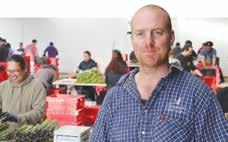

A NOT-SO-HUMBLE spud
has won another feather in the cap for a family horticulture business based at Southbridge, near Christchurch, with an award in the annual Life and Leisure Magazine Outstanding Food Producer Awards.
Oakley’s Premium Fresh Vegetables Golden Gourmet potatoes, which are sold in Oakley-branded boxes in supermarkets around the country, took out the Spirit of New Zealand Award, which specifically rewarded the sustainabil-
ity of the producer. It was one of 17 champions chosen from 355 entrants, with a vegan chocolate chosen as the supreme champion.
Oakley’s marketing manager April Oakley said The Spirit of New Zealand Award aimed to recognise a business with outstanding credentials for producing quality with a “considered” footprint.
She said the competition involved a three-day weekend of food writers, chefs and industry experts initially blindtasting entries to judge them purely on the quality of the food.

Oakley described the Golden Gourmet as more of a waxy rather than a
TOUCH WOOD, to date the kiwifruit season has generally been good. That’s the view of Colin Bond, chief executive of New Zealand Kiwifruit Growers Incorporated (NZKGI), the organisation that represents kiwifruit growers.
Bond says this good news comes after two challenging years where weather and labour had been a problem.
But he says this season has been a turnaround with no problems with labour or weather and it’s been a very solid growing season. Bond says the favourable weather has meant picking the kiwifruit harvest has been much easier, with few stoppages, meaning a continuous flow of fruit into the postharvest facilities.
“We just need this to continue so that we can get all the fruit off the vines in the same good condition as we have been able to so far,” he says.
Two things that helped this season,
says Bond, are the plentiful labour –with more backpackers coming into the country, the lifting of the cap on the number of RSE (overseas) workers from the Pacific Islands allowed into NZ and the rise in the number of kiwi’s seeking work in the sector; and new postharvest automation which requires less labour.
“The most important thing for post-harvest has been the high quality of fruit coming into them from the orchard. With plenty of well-trained staff, combined with the good weather, the post-harvest people are getting consistent supplies which allows them to have better structured shifts and achieve greater efficiency,” he says
Bond says overall the season has been good, but there are regions such as Tairawhiti where the effects of Cyclone Gabrielle and other rain events have caused big problems for some growers.
– Peter Burkefloury potato, but one suitable for both boiling and roasting.
The blind taste-testing was “as straightforward as possible,” she said.
“So, they don’t necessarily put it with a bunch of things. It’s just boiled and roasted, a little bit of salt, and then they taste it.
“Then from there the judges looked at the business – you put in some information about what you do, what your mission is, a bit more about sustainability practices and so on.”
She said Oakley’s farming practices included such things as extensive soil testing, and moisture
probes. “Everything we do is precision agriculture.
“But also, a big part has been the fact that we power our site mostly by solar. We’ve got one of the largest solar farms in the South Island on our farm.”
Installed about two years ago, the solar farm powers the potato grad-
ing, washing and packing lines as well as the coolstores that allow them to store and supply potatoes year-round.
Also producing pumpkins, broccoli, beetroot and onions, the company won three Ballance Farm Environment Awards in 2020 (second only to the overall regional winner) for excellence in soil management, scientific monitoring and innovation. They have been early adopters of technologies such as farm-wide moisture probes to forecast irrigation requirements, and extensive soil and plant nutrient testing to calibrate fertiliser applications for maximum quality and yield.
Manager Robin Oakley said then that it was all part of a common-sense approach, putting in technology that stacks up on commercial returns.










WITH THE first harvest of high-quality table grapes from 700 vines just completed, the attention of Japanese company Greencollar is on preparing to harvest from 1400 vines next summer, and putting in another 1500 this planting season.
With the 400 planted in 2023, that will bring the vine count to near 3000. This year’s first harvest confirms the premium grape varieties, Yuho and Violet King, will excel in Hawke’s Bay’s proven grape-growing climate. The large seedless grapes are very popular for their sweetness, flavour and thin skins.
Until now, table grape growing has been a very small industry in New Zealand, with just 30ha devoted to commercial production across the country. Greencollar is determined to take advantage of the East Coast’s impressive growing conditions to rapidly build the industry, starting with planting 20 hectares in Hastings.
By full production –around 2029, depending on planting year – the vineyard is expected to yield around 240 tonnes of ultra-high quality table grapes, to be exported mainly to Japan and wider Asia, but also sold on the New Zealand market, says Hastings-based chief executive Shin Koizumi.
Growing ultra-high quality table grapes in New Zealand will allow Greencollar to sell the grapes in Japan and Asia during those regions’ offseason. Considered the King of Fruit in Japan, a bunch is often beautifully gift-wrapped and presented to show gratitude, or to wish someone season’s greetings.
This year, all the grapes were sold on the New Zealand market, primarily via high-end retail outlets, with a plan to export for the first-time next harvest.
The specially-bred grapes, Yuho and Violet King, are sweet, thinskinned, seedless and packed with flavour
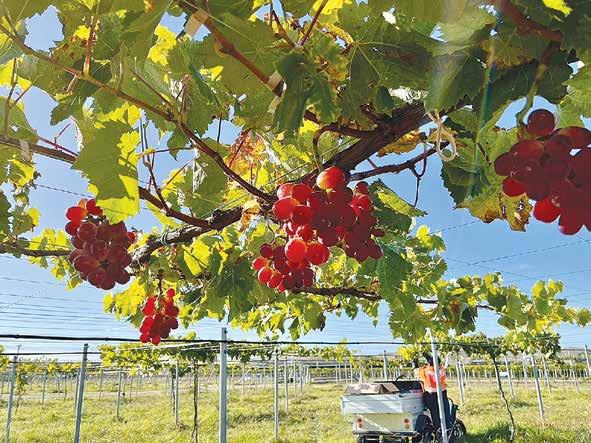
and require a great deal of care. At the beginning of the growing season, just one bunch per shoot is selected to stay on the vine with the rest of the flowers carefully removed. Each of the remaining bunches is
hand-thinned three times to increase fragrance and sweetness, covered by delicate paper, and further protected by a little umbrella shade.
While growing the world’s best seedless table grapes is the prime
aim, the company is also focused on ensuring the company’s employees have a work-life balance that is not typical in Japan.
Koizumi is passionate about grapes, but he is equally passionate about
people having meaningful work balanced with opportunities for leisure that enhance their lives.
“For 30 years I worked in an office as a typical white-collar worker, commuted on a packed train, meeting after meeting,
Peter Burke peterb@ruralnews.co.nz
SOME SMART planning by NZ’s onion growers has enabled them to quickly cash in on the Free Trade Agreement between New Zealand and the European Union which came into effect on May 1.
A key benefit of the FTA sees the removal of 9.6% tariffs on our onion exports there, a move that is expected to save our onion growers around $3 million annually. About 85% of the onions NZ produces are exported, mainly to Europe and Southeast Asia.
But with the 1 May deadline for the EU tariff removal looming, onion exporters decided to keep as much of



their exports to the EU in customs facilities for a few weeks longer so that they could take advantage of the tariff free regime from the beginning of May.
Onions NZ chief executive James Kuperus says then on May 1 the onions were released from the customs facilities and were able to enter the EU duty free – “a great outcome for our people”. He says he’s not sure exactly what tonnage of onions were in storage but suggested that a figure of up to 35,000 tonnes total will enter the EU duty free this year.
“We’re very grateful to NZ Parliament for approving the FTA earlier than expected, allowing it to come into force when it did. Once we knew
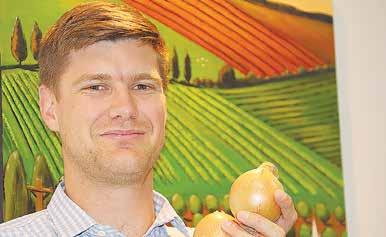
that, we were able to plan to gain the maximum benefit from this decision,” he says.
Kuperus says the FTA has come at
a good time for the industry which has seen it bounce back from a couple of difficult years. He noted that about 40% of the onion crop in
then I went home late at night just to sleep.
“I was searching for a new lifestyle where I wasn’t white-collar, nor blue-collar. I wanted to work under the blue sky and sun, that’s when I founded Greencollar.
“The passion for grapes comes from time spent helping his grandparents harvest fruit in Yamanashi prefecture.
“When I was a child, I used to help harvest grapes and cherries at my grandparent’s house in Yamanashi prefecture. I remember the air and the sun, and I also remember taking fruit home with me to take to school, which made all my school friends very happy.
“What we are doing now, growing grapes in Hastings and in rural Japan, brings together all of those elements –beautiful fruit, a wonderful lifestyle and making people happy.”
The Hawke’s Bay venture complements an 8ha vineyard the company has planted in Japan.
Hawke’s Bay was destroyed last year by Cyclone Gabrielle but the region has recovered well this season.
“Overall, we’ve had a very good growing season compared to other years, so our quality is much better. We have a much longer export season, we are going to be able to supply all our long-standing customers, so it’s been much kinder to our growers,” he says.
Kuperus says the outlook for the export of onions is good. He says there is increasing demand for the product and NZ is well placed to meet that demand – especially given our reputation for producing a high-quality product. He sees the key markets as Europe, Southeast Asia and China.



HAVE YOU tried a persimmon? Chances are you haven’t. The Persimmon Industry Council believes many people haven’t tried the unique fruit, only available for six short weeks from late April through to early June.
Persimmons are as big and colourful as an orange, shaped like a tomato and can be eaten like an apple.
Council manager Ian Turk says persimmons have been grown commercially in NZ since the 1980s when the Fuyu variety was introduced.
“Prior to then persimmons were grown in home gardens, but these were an astringent variety which needed to be very soft before eating, to reduce tannin levels,” he told Hort News.
About half of persimmons grown in NZ - 1300 tonnes - are exported. On why persimmons haven’t taken off in NZ, Turk says it’s a relatively new fruit and the domestic market has been growing.
“But with the industry’s focus on growing for export, most of the commercial production has been sent to export markets.
“So, in New Zealand, has not been well known, or well supplied.”
Turk adds that the fruit is becoming more well known and the local


market has really taken off over the last three or four years.
“But there’s still a lot of people who haven’t tried one.”
His message to people is to go and buy one or two persimmons.
“I’m pretty sure it’s a taste experience you’ll be glad you took the punt and tried,” he says.
Persimmons are an ancient fruit extremely popular in Asia.
Persimmon Industry
says it’s
5+ A DAY has lots of persimmon recipes online including roast persimmon breakfast bowls, persimmon kūmara and ginger soup, persimmon feta and rocket salad and persimmon tart with mandarin glaze. While persimmons are mostly eaten as fresh fruit, they can be added to smoothies, baking or salads.
5+ A Day trustee and principal scientist and team leader at Plant and Food Research, Dr Carolyn Lister, says persim-
“Some New Zealanders might remember having a tree in their
mons contain important nutrients and plant compounds including flavonoids and carotenoids which can positively affect your health.
“They are technically a berry and are a good source of vitamin C and a source of dietary fibre and potassium. Eating a wide range of fresh fruit and vegetables –and trying new things such as persimmons – is the best way to help maintain a healthy body weight, boost brain function
backyard of an old variety of persimmons that were astringent, so they
and protect your heart health.
“As we head into winter, we can support our immune systems by eating fruit high in vitamin C and all New Zealanders should be looking to eat two pieces of fruit a day as part of a healthy balanced diet. Persimmons have one of the shortest supply windows of any fruit, so make the most of them while you can.”
Generally, in the season flush they retail around $6 to $10/kg.
had a lot of tannins in them. They had to be really overripe and mushy
before you could enjoy them,” says Turk.
“But now we grow a
modern variety called Fuyu which you can eat like an apple. It’s nice and sweet and crisp. Just slice it into wedges and eat them that way. As it ripens, the unique persimmon flavour comes through more strongly.”
When buying persimmons in the supermarket, look for a good orange colour and firm skin.
“You want them while they’re still hard and crisp and then if you like them a bit softer, they’ll ripen in your fruit bowl over the next few days,” says Turk.
The Persimmon Industry Council is focused on growing for export. The council has about 30 grower members, two thirds in Gisborne, three in North Auckland and one each in Waikato and Northland. All grow the fruit for export. The biggest markets for NZ persimmon last year were Australia, Thailand, Canada, Hong Kong, Singapore and Vietnam. Turk says there are some other growers who supply domestic market only.
“We have a small group of growers and exporters with good demand for our product. We see that the industry will show modest growth, particularly from within the existing growers who have knowledge and experience with growing persimmons for export.”
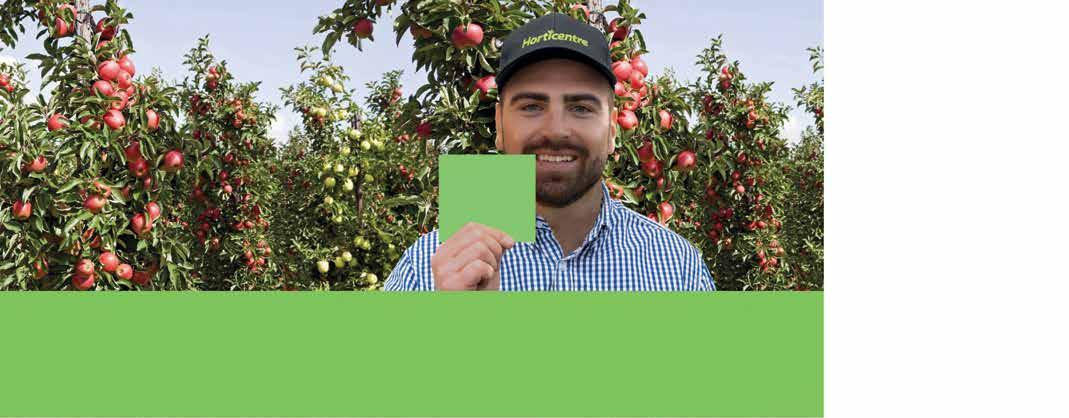








A WELL-KNOWN name is being showcased at Fieldays as Palmerston North-based Norwood takes over the distribution of the Landini tractor brand.
Landini’s REX4 specialty tractor range, winner of the 2024 Tractor of the Year Award at last year’s Agritechnica event, is available in cab and platform options, a choice of transmissions and front and rear axle variants to provide different wheelbase sizes, ground clearances and track widths.
Offered in six models to suit traditional orchards spaced at 1200mm widths or








narrow orchards and vineyards spaced at 1000mm, the REX4 is equipped with a 24Fx24R (36F x 36R with creeper) Hi-Lo transmission as standard for the New Zealand market.
Upgrades include the new RoboShift 36F x 12R (48F x 16R with creeper) transmission, featuring robotised gear and range shifts, Stop&Action brake-to-stop control, and Auto Mode, seamlessly controlled by the new SmartPilot multifunction joystick.
Configuration of the cab-equipped REX4-080, 090, 100, 110, and 120 is available in F, S, V, and GT formats, while the platform-type REX4-080, 090, 100, 110, and 120 is available in F, GE, GB, and GT models.
Engines are supplied by Deutz AG with their 4-cylinder 2.9-litre unit offering maximum outputs of 75, 90, 95, 102 and 112hp with the Rex 80,90, 100, 110 and 120 models respectively.
The hydraulic system can be tailored to meet individual requirements, with a double pump layout that supplies 58 + 30 l/min to the rear hitch and spool valves and 30 l/min to the steering system is standard, with an optional 30 + 58 + 36 l/min triple pump set up that delivers 88 l/
Offered in six models to suit traditional orchards spaced at 1,200mm widths or narrow orchards and vineyards spaced at 1,000mm
min for high-low demand equipment. Other options include either a flow selector with diverter or a flow diverter valve, and additional hydraulic stabilisers.
The interior of the cabin is inspired by automotive styling, with key controls at the operator’s fingertips, a digital dashboard for performance information and a tilt and telescopic steering column.
Comfort is enhanced with an air suspended seat, ergonomically placed joystick and, in the case of F and GT versions, the option of front axle and cab suspension systems.
Innovative digital technologies on the REX4 sees the Precision Steering Management satellite guidance system, which improves working accuracy and efficiency, with the ISOBUS system ensuring control of implements, including when they are in automatic mode. REX4 also features an innovative hybrid driver
assist system to help operators in manoeuvring both in the field and on the road.
At the other end of the spectrum, the flagship Series 8-310 is a heavyduty prime mover suited to fieldwork and transport situations, featuring a six-cylinder, FPT/ NEF 6.7-litre engine delivering a maximum output of 313hp/1282Nm torque, with 1000-hour service intervals.
In turn, the engine is mated to the V-shift, continuously variable 4-stage transmission offering speeds as low as 40metres/hour or 50km/h. Closed Centre Load Sensing hydraulic systems offer rates of 160l/min with a high flow option of 212l/min, powering up to six remote valves.
Rear lift capacity is 11,000kg matched with a 3-speed PTO system. A 11,000kg shipping weight offers a maximum 16,000kg operating capacity, with tyre choices up to 900-65R42.